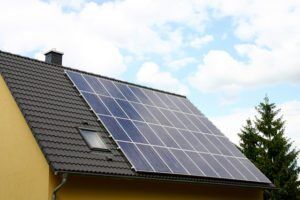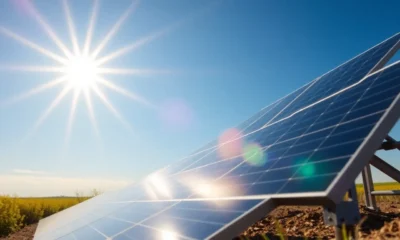

Energy
Rates on Solar Rooftop Installations Could Rise Eight Times Next Year
There is a call for intervention by Ministers from the Solar industry to avoid a crippling tax hike.
As reported by the Financial Times today, the Solar Trade Association has uncovered that business rates taxes on commercial rooftop solar installations will rise by between six and eight times as of April next year unless Ministers intervene.
Paul Barwell, CEO of the Solar Trade Association, commented:
“This is a huge increase in the running costs of a rooftop solar installation that will affect both existing and new projects. In some cases, it would actually send installations into negative returns: you would be spending more on the system in tax and maintenance than you would be getting back from the sale of the power and the Feed-in Tariff support.”
We therefore need Ministers to step in as soon as possible. The system needs to recognise that solar is a unique technology with both costs and revenues having come down over the last five years.
“This has created a complete mis-fit with the business rates system that needs to be fixed, or else we will face a prohibitive tax hike in this sector.”
The change is coming due to a wider re-evaluation of business rates that takes place every five to seven years, where the Valuation Office Agency looks at how assets are valued, the income they generate and how costs have evolved over that period.
However, solar PV presents a particular challenge as a capex heavy technology where both costs and subsidies have dropped dramatically over the past five years. The issue is that the ‘rateable values’ that will come into force for rooftop solar as of next year bear little relation to the revenue generated by the installations but are instead based on fixed assumptions about capital costs of installation.
This does not affect domestic solar homes – only businesses that have solar on their roof, where they themselves own the system and installed it with a view to using most of the electricity themselves. Public authorities, schools and community buildings that have solar on their roofs are also at risk of being affected by this tax rise, although there are exemptions e.g. some agricultural buildings as well as some small business exemptions.
This massive hike in business rates for commercial solar PV will come into force as of 1 April 2017, unless the Government intervenes between now and then. The Solar Trade Association has been in talks with the Valuation Office Agency and its equivalent bodies that administer business rates in devolved administrations, however the problem lies with the way business rates legislation is worded and therefore requires attention from government.
Paul Barwell continued:
“Even though this is a wholesale change in the methodology used to calculate business rates for solar when compared with the last seven years, we don’t think the hike is intentional. It is rather an accidental by-product of the established business rates system and how it applies to solar PV.”
“This is a complex issue. We believe the methodology shouldn’t be applied to solar rooftops in this way. We now plan to work with the three different government departments – Treasury, Communities and Local Government and Energy – to discuss our proposals to exempt self-owned rooftop solar from business rates altogether. Ministers must act now, otherwise this tax rise will all but eliminate the incentive for businesses to invest in solar.”


 Environment12 months ago
Environment12 months agoAre Polymer Banknotes: an Eco-Friendly Trend or a Groundswell?

 Features11 months ago
Features11 months agoEco-Friendly Cryptocurrencies: Sustainable Investment Choices

 Features12 months ago
Features12 months agoEco-Friendly Crypto Traders Must Find the Right Exchange

 Energy11 months ago
Energy11 months agoThe Growing Role of Solar Panels in Ireland’s Energy Future



























